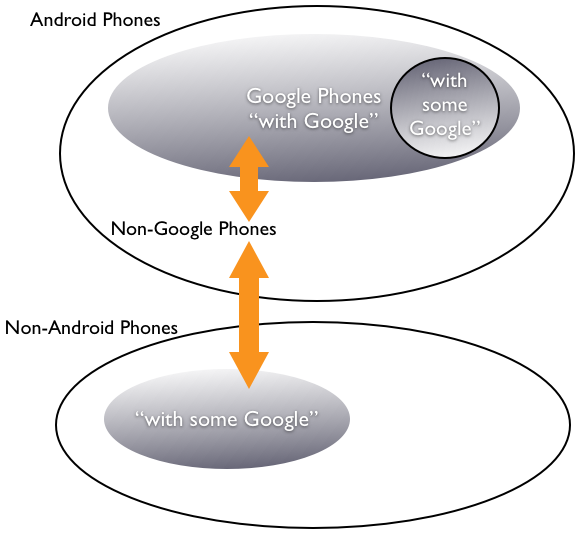Google has created a partial list of phones that run Google services.
I notice with interest that it’s called a Google Phone Gallery not an Android Phone Gallery.
What’s more, there is a distinction of All Phones and Phones “with Google”. Of course that implies that we can get a list of Google Phones “without Google” (or maybe more accurately, “with partial Google”).
To clarify, according to Google there are three categories of Android Phones:
- Google Phones “with Google” have been optimized for use of Google Mobile Services, providing easy access to Search, Voice Search, Google Talk, Google Maps, Gmail, Sync, YouTube and Android Market (where available).
- Google Phones “without Google” list includes Android phones that have the Android market, Search, Maps and Gmail. You can get this list by subtracting the Google Phones “with Google” from all the Google Phones.
- Non-Google phones. Android phones that have no Android market or any Google services. You can get this list by taking a list of all Android phones (e.g. from pdadb.net) and subtracting all Google Phones.
I would also add a fourth category of Google phones:
- Non-Android phones that serve up Google services just fine.
Since the list is not complete, I won’t tally it here, but it suggests a large number of Non-Google phones is possible.
[I drew the following Venn diagram to help explain the situation. The shaded areas are those which generate revenue for Google. The interesting struggle (marked with arrows) is between the non-Android Phones with some Google and the Android Phones without any Google.]
Now the question that needs to be asked is: How many of the Non-Google Android phones are built to compete with Google (e.g. on Search, Voice, Maps, Media and App sales)? And a second question: How are the Non-Android phones “with some Google” competing with the Non-Google Android phones.
In other words, from Google’s point of view: how successful are companies other than Google at delivering Google services in spite of competition from companies with Android phones delivering services that compete with Google?
The classic example being: how effective are iPhones with Google services at competing with Verizon Droid Android phones that deliver Microsoft services? In this scenario Apple is delivering value to Google shareholders while Verizon (using Android) is taking it away.
Is this trade-off a net positive?
In other words, is Google’s income from the iPhone offsetting its losses from Android?
Discover more from Asymco
Subscribe to get the latest posts sent to your email.

